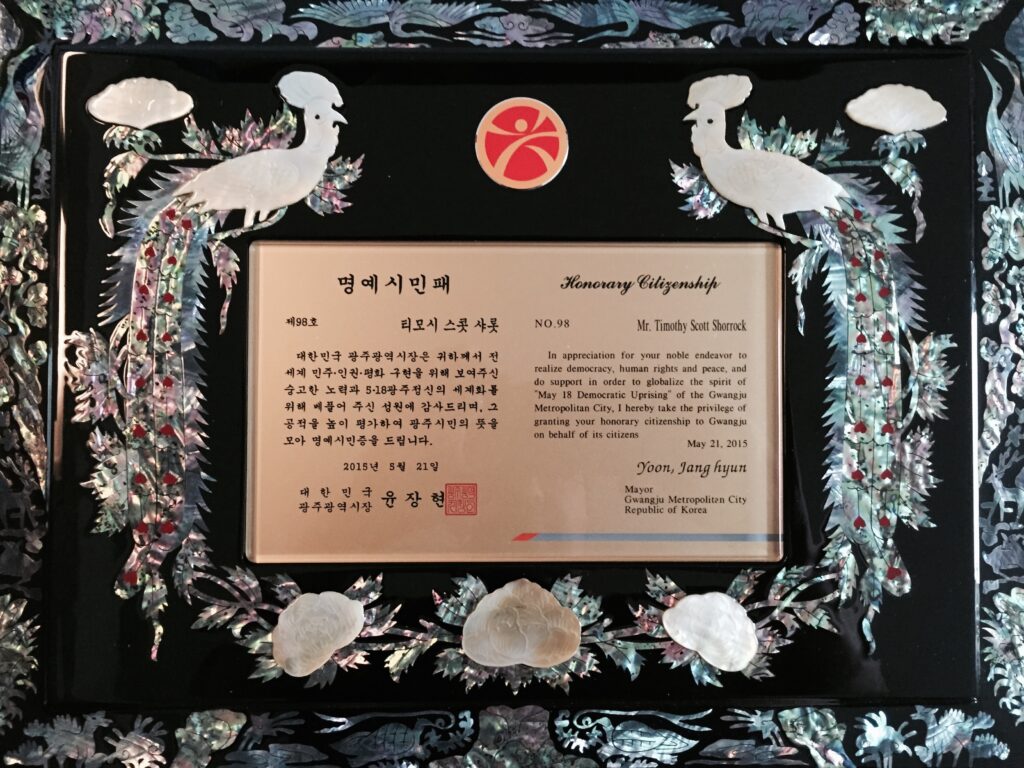ABOUT THE AUTHOR
Tim Shorrock is a Washington-based investigative journalist who grew up in Japan and South Korea and has lived in DC since 1983. He is the author of SPIES FOR HIRE: The Secret World of Outsourced Intelligence and is currently working on DMZ EMPIRE, his second book.
This website, a companion to his Patreon, is a multi-media platform for 60+ years of reporting on U.S. intervention in Korea and Japan, American foreign policy in Asia, the intelligence industrial complex, global capitalism, music & culture, and popular resistance from Gwangju to Washington. It will be updated continuously with articles and analysis on current events, new additions to his archives, and weekly posts from his Anthology.
Shorrock explains his project:

“I ain’t dead yet/My bell still rings.” So sings Bob Dylan, paraphrasing our mutual hero Woody Guthrie. Well, I’m back too, still creating and burning through the words, and deep into writing my next book. With this launch, I’m moving into a new phase of my life and journalism career with a compendium of my work from the late 1970s to now. I’m modeling the project after Dylan’s vast output of official “bootlegs,” in which he finally released songs he’d recorded but didn’t put on a record – thus the moniker “rare and unreleased.”
By subscribing and becoming a patron, you will support my journalism and writing into the future and help me maintain and make available to researchers, journalists and students two separate and searchable archives of my work on US military and political intervention in Korea and Japan, US foreign policy, and the US Intelligence Industrial Complex. Maintaining these archives takes enormous time and resources, so your patron donations will go a long way.
One section of the archives is devoted to the Cherokee Files, the 4,000+ declassified documents I obtained about the US background role in the 1980 Gwangju Uprising in South Korea. The DMZ Empire Files, is devoted to a new archive for my book-in-progress, my tale of the US intervention in Korea and Japan after World War II that created the US military garrison in Asia I call the DMZ Empire. They include photographs, audio of crowds and radio broadcasts, interviews, declassified documents from FOIA requests and the National Archives, and much more. The website also includes links to nearly all the reporting I’ve done on US intelligence and the privatization of spying over the past 20 years. If there is enough interest, and I can raise enough funds, I will also carve out a separate website to track the growth and expansion of the five corporations that now dominate the US intelligence market.
An Unorthodox Journalism Career
Tim Shorrock began writing for publications in the late 1970s, after the Vietnam War, when he began sending articles about North and South Korea to newspapers and magazines critical of American foreign policy. As a freelancer in Seoul in the early 1980s, he wrote for several Bay Area newspapers, including the San Francisco Chronicle and the Oakland Tribune, as well as for leftist publications like the (old) New York Guardian and The Progressive. He moved to Washington, D.C. in 1982, where he worked as a journalist and investigative reporter for the rest of the century and well into the 21st. In DC, he spent 20 years in the business press, primarily in the Washington Bureau of the New York Journal of Commerce, before going freelance in the last years of the Clinton administration. During that time, he covered the shipping industry, labor, the divisive politics of globalization and trade, and East Asia, serving for a time as the paper’s bureau chief in Tokyo.
Starting in 1983, Shorrock spent 40 years as a correspondent for The Nation, one of the oldest magazines on the American left. In 2001, in the first months of the Bush administration, Shorrock began a fruitful period of investigative reporting that quickly broadened into a deep dive into the national security state.
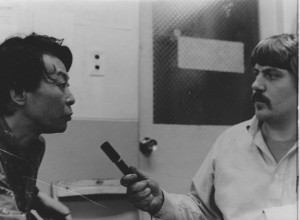
The 9/11 attacks in 2001 and the subsequent transformation of US foreign policy provided plenty of fodder. During that time, he published a stream of stories on such topics as the role of the AFL-CIO in the Cold War, George W. Bush’s grandiose plan to privatize Iraq, and the “access capitalism” of the Carlyle Group and other investment banks that relied on former presidents and high-ranking national security officials for investment advice.
The Carlyle story, and his further investigations into the murky world of defense contracting, sparked a deep interest in the privatization of US intelligence. In 2008, Shorrock published Spies for Hire: The Secret World of Intelligence Outsourcing, telling the story of how private contractors were working at the highest levels of US intelligence, including for the powerful National Security Agency. While living in Memphis, Tennessee, from 2005 to 2007, he reported on the devastation and human suffering in New Orleans and the Gulf Coast caused by Hurricane Katrina. In 2009, with the world of journalism he had known since the 1980s on the verge of collapse, Shorrock left the trade for a few years to work as a researcher at a labor union for federal public sector workers, where he continued his investigations of contractors. But he never stopped writing and reporting.

In 2013, Shorrock returned to Korea after a long absence when he was invited to Seoul to witness the rising opposition to President Obama’s policies in Korea and the South Korean conservatives who had taken power in the wake of the progressive presidencies of Kim Dae Jung and Roh Moo Hyun. Two years later, in 2015, he received one of the great honors of his life when the city of Gwangju made him an honorary citizen for his reporting on the US role in the 1980 uprising. Circumstances then led him to begin covering the northern half of the Korean Peninsula. In 2017, during deepening tensions between North Korea and the United States, Kim Jong Un, the 30-something leader of the DPRK, exploded another nuclear device (his third in 9 years) and begun a series of tests of long-range ICBM missiles that could hit the United States. This set off the latest nuclear “crisis” on the Korean Peninsula that continues today.
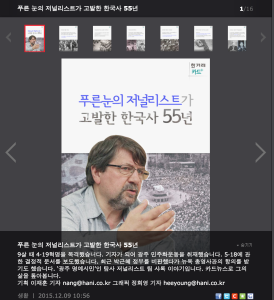
In 2018, South Korean President Moon Jae-In stepped into the breach with a peace offering that led that spring to his first summit with the North Korean leader and, later that year, Kim’s offer to meet with President Trump. That June, Shorrock crowd-funded – largely through this website – his way to Singapore for Trump’s summit with Kim, where he reported live for Democracy Now, The Nation, and South Korea’s investigative publication Newstapa. Over the next three years, he covered the U.S.-North Korean negotiations and the unfolding peace process, mostly for The Nation and Newstapa.

In 2022, he was one of several experts to be interviewed for Blowback, an investigative podcast on the Korean War co-hosted by the journalists Brendan James and Noah Kulwin (watch the awesome teaser here). The site included an exclusive interview with Shorrock on his unorthdox journalism career. Shorrock is also a regular contributor to Responsible Statecraft, a project of the non-aligned Quincy Institute. He appears frequently on South Korean radio and television as a commentator and analyst, and has been interviewed on Democracy Now, NPR’s Fresh Air, and other American outlets.
Over the years, Shorrock’s work has appeared in many publications in the United States and abroad, including the New York Times, Salon, Daily Beast, Mother Jones, The Progressive, Foreign Policy in Focus and Asia Times.
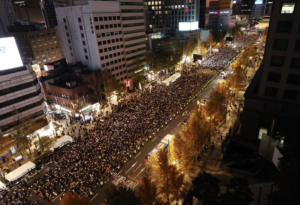
Shorrock writes in the spirit of international solidarity. In the photo at the top of this page, taken in 2017 by Minnesota photographer Stephen Wunrow, he was paying respects in the Port of Mokpo to the 300-plus victims of the Sewol sinking in 2014. At that time, more than 300 high school students drowned in a ferry accident directly caused by government negligence and mismanagement. That incident led to the downfall of the government of Park Guen-hye, and today is being compared to the calamatious crowd surge in the international camp town of Itaewon in Seoul on October 29th that killed over 150 people, including many foreigners. Fault for the latest calamity is widely being laid at the feet of the Yoon government in Seoul, which failed to provide the security needed to control the crowds of 100,000 and more that were expected for the Halloween celebration in the town that used to surround the giant U.S. military base at Yongsan (for an excellent run-down of what happened and Itaewon’s origins as a red-light district for American soldiers, read Nodutol‘s summary here).
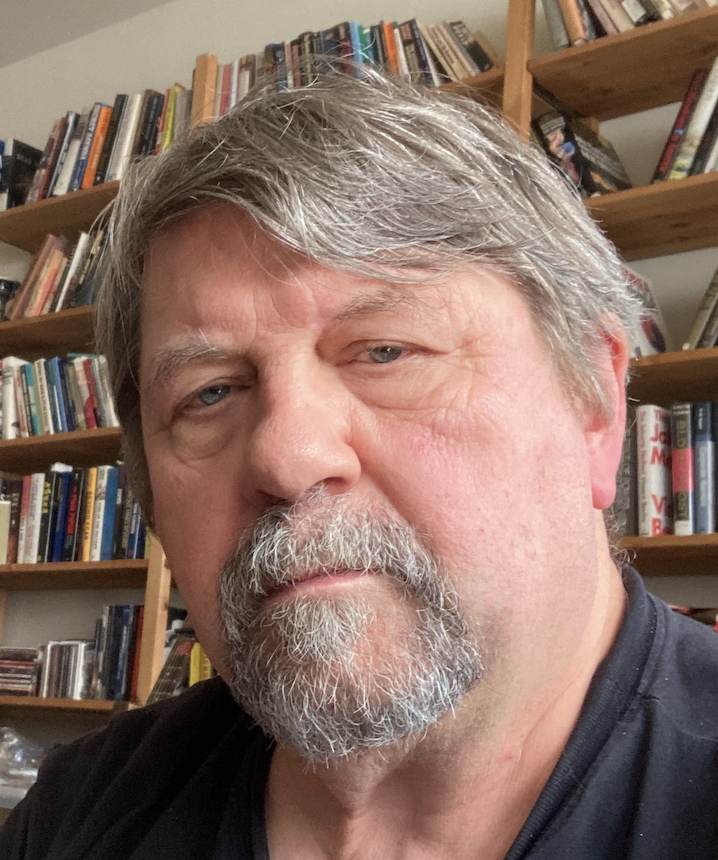
Some of Shorrock’s Greatest Hits:
— “The Cherokee Files – Kwangju, Turning Point in the Cold War in Asia,” Shorrock’s original story on the FOIA documents published by Sisa Journal (now Sisa-In) in February 1996.
— “Ex-leaders Go on Trial in Seoul,” Shorrock’s original story on the Cherokee Files from the Journal of Commerce, February. 27, 1996.
— “South Koreans Protest After Disclosure of U.S. Decision in ’80 Uprising,” Washington Post, 1996. Reporter Jeffrey Smith wrote this after hearing about my stories from sources in Korea, about a week after my JOC and Sisa stories were published. The New York Times, as advised by Nick Kristoff, its then-bureau chief in Tokyo, never mentioned my revelations of U.S. complicity.
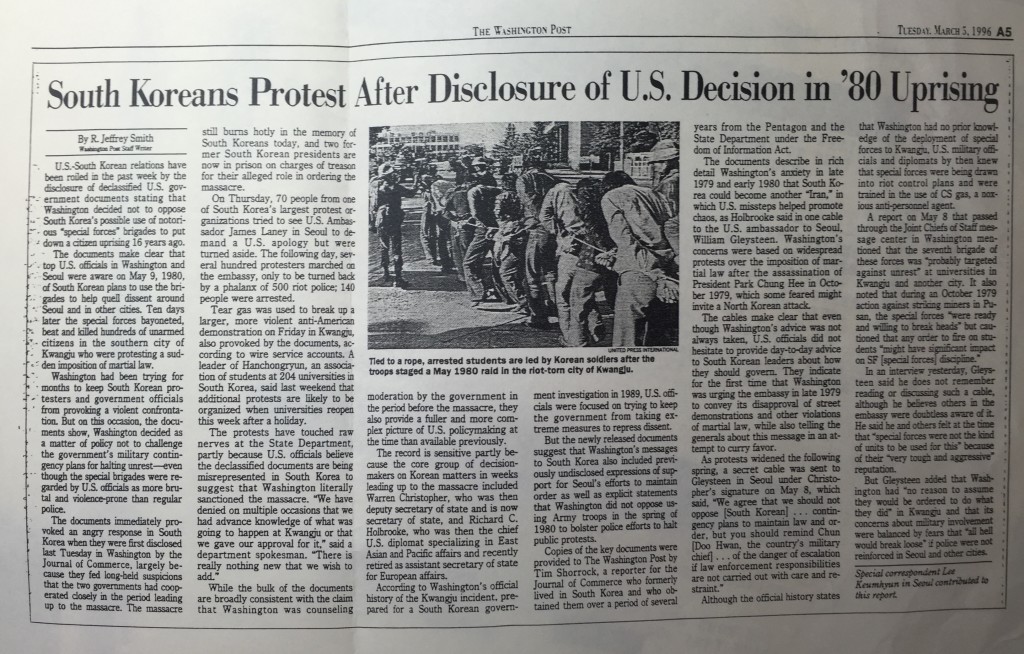
— In 1985, Shorrock interviewed Kim Dae Jung while he was under house arrest in Seoul a decade before he was elected South Korea’s president, In the interview, which appeared in The Progressive, Kim publicly discussed the US role in Gwangju for the first time. “The Kwangju people kept order; paratroopers broke order,” he said. “You should have criticized the paratroopers’ side, not the Kwangju people’s side. Your attitude was not just, not fair.”

— “The Corporate Takeover of U.S. Intelligence,” Salon, June 2007 – Shorrock’s scoop that 70 percent of the U.S.intelligence budget of spent on private contracts. That’s seven-oh, 70, and made spying for hire a $50 billion business.
— “Meet the contractors analyzing your private data — Private companies are getting rich probing your personal information for the government. Call it Digital Blackwater.” Salon, June 10, 2013.
— A 2005 expose in Mother Jones of the massive outsourcing taking place in US intelligence, Shorrock’s first foray into U.S. intelligence.
— Shorrock’s 2003 investigation into the AFL-CIO archives of Labor’s Cold War for The Nation.
— One of the first exposes of the Carlyle Group (The Nation).
— A thorough reaming of Paul Wolfowitz from Asia Times – long before 9/11 made him a key player in the Bush administration’s foreign policy.
Honorary Citizenship, Gwangju City
